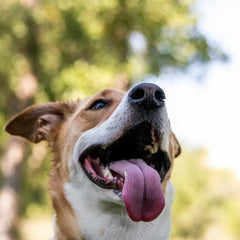As pet owners, we often find ourselves sharing bits of our meals with our furry companions. After all, who can resist those pleading eyes? One common food that many pet owners question is ham, especially during holiday seasons when it's a staple on many dinner tables. But is ham safe for dogs? Let's dive into the details.
A Holiday Food Examined: Ham Hints
Ham, a popular meat especially during festive times, is derived from the hind leg of pigs. It's often salt-cured or smoked, and while it's a flavorful meat that many humans love, there are several considerations to keep in mind when it comes to sharing it with our dogs.
Nutritional Overview of Ham:
- Protein: Ham is a good source of protein, an essential nutrient for dogs.
- Vitamins & Minerals: Contains vitamins (notably B6 and B12) and minerals such as zinc, phosphorus, and thiamine.
- Sodium: Due to curing processes, ham tends to have a high sodium content.
Risks of Ham for Dogs
While ham itself is not toxic to dogs, several factors make it less than ideal as a regular treat:
- High Sodium Content: The high salt content in ham can be harmful to dogs if consumed in large quantities. Excessive salt can lead to salt poisoning or water deprivation in dogs, causing symptoms like vomiting, diarrhea, high temperature, and seizures.
- Preservatives & Additives: Many hams contain preservatives, additives, or flavorings that might not be suitable for dogs. These can cause stomach upsets or more severe reactions.
- High Fat Content: Ham, especially the more decadent cuts, can be fatty. Too much fat can lead to obesity and conditions like pancreatitis in dogs.
- Bone Hazards: Ham bones can be a choking hazard, and if splintered, they can cause obstructions or injuries in the digestive system.

How to Safely Feed Ham to Dogs
If you decide to give your dog a taste of ham, here are some guidelines:
- Moderation is Key: Given the high sodium and fat content, ham should be an occasional treat and not a regular part of your dog's diet.
- Avoid Bones and Fat: Make sure to remove any bones and excessive fat from the ham before giving it to your dog.
- Opt for Low-Sodium Varieties: If possible, choose ham that has lower sodium content.
- Cooked Over Raw: Always give your dog cooked ham. Raw ham can carry pathogens that can be harmful to dogs.
- Consult Your Veterinarian: Before introducing any new food to your dog's diet, it's always best to consult with a veterinarian.
Frequently Asked Questions
1. How much ham can I give my dog?
It's best to give small amounts. For smaller dogs, a bite or two is enough. Larger dogs can have a bit more, but always in moderation.
2. My dog ate a lot of ham, what should I do?
Monitor your dog for any signs of salt poisoning or digestive upset. If your dog shows any distressing symptoms, contact your veterinarian immediately.
3. Can I give my dog ham bones?
It's best to avoid giving ham bones to dogs as they can splinter and pose a choking hazard or cause internal injuries.
Conclusion
While sharing a slice of ham with your dog during the holidays might seem like a loving gesture, it's essential to do so with caution. Always prioritize your pet's health and well-being, and when in doubt, consult with a professional. Remember, a happy dog is a healthy dog.




